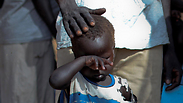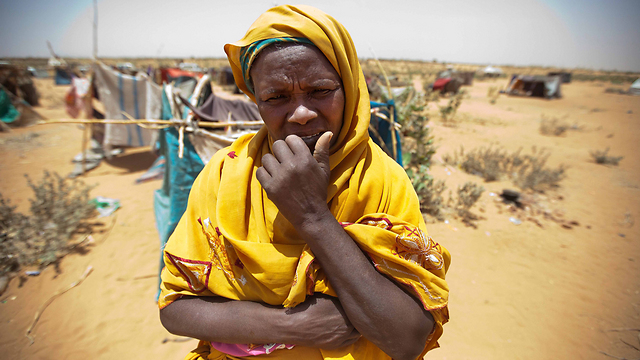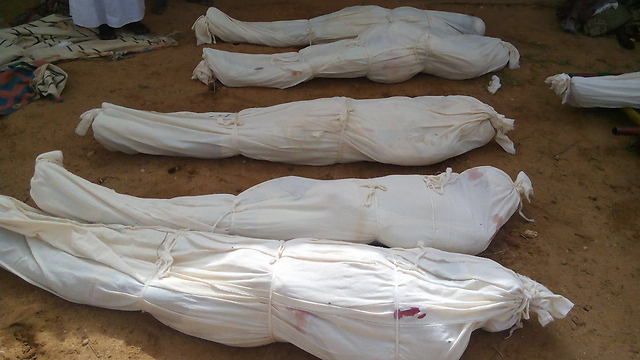
Report ignored by state could grant Darfur refugees legal status in Israel
A legal opinion issued two years ago stating that any former Darfur resident from a non-Arab tribe is automatically entitled to political asylum in Israel has allegedly been concealed from the courts by the Population and Immigration Authority. Now that the recommendation has been revealed, it can be used by thousands of Darfur refugees to try to gain legal recognition.
The opinion clearly has far-reaching consequences for asylum seekers. But although it was written two years ago, throughout this entire period the PIBA has been implementing the government’s orders and doing everything in its power to make Darfur refugees leave Israel. Moreover, in these past two years, PIBA officials have been telling the courts that “a policy has yet to be determined” regarding the Darfur residents.
The legal opinion, which was exposed by Yedioth Ahronoth, Ynet's sister publication, for the very first time on Monday, raises suspicions that PIBA officials may have concealed critical information from the courts. The opinion on this matter is comprehensive, including information and examples of similar asylum seekers’ appeals from around the world. The RSD employees who penned the opinion are tasked with providing recommendations to PIBA officials and to the government ministers who are supposed to make the final decision on this matter.
Officially, PIBA sources argue that this is an internal document, rolling their eyes and explaining that these are only recommendations. Mainly, they cling to the fact that the interior portfolio passed through the hands of five different ministers since the opinion was written: Gideon Sa’ar, Gilad Erdan, Silvan Shalom, Benjamin Netanyahu and Aryeh Deri.
Behind the scenes, however, a senior source says that the PIBA director-general personally approved the report and that the delay is being caused by the higher ranks. This means that the courts would find it difficult to ignore the legal opinion if it were to be submitted together with Darfur refugees’ asylum requests. Alternatively, it’s quite possible that in the coming days the government will have no choice but to accept the opinion and allow the thousands of Darfur residents who have yet to be deported to officially stay here as refugees.
One in 18,904 requests approved
Although all decision makers in the PIBA are well aware of the legal opinion and although it has even been handed over to the advisory committee, which includes officials from the Justice and Foreign Ministries, the PIBA repeatedly declares in its responses to the court—including in two cases from the past few weeks—that a policy on the Darfur asylum seekers “has yet to be determined.”
According to figures that the PIBA provided to Amnesty International Israel under the Freedom of Information Law, as of November 9, 2016, there were 18,904 asylum requests awaiting a decision. Deputy Attorney General Dina Zilber admitted last March that Israel was neglecting the asylum requests.
How many of those requests have been accepted? Well, only one of the Sudanese’s requests was handed over to the advisory committee: the one filed by Mutasim Ali, who was recognized as a refugee after a long legal battle. All the while, 1,825 Sudanese have already been interviewed, and a further 400 are still waiting for the interview stage.
Many Israeli officials have argued in recent years that the Sudanese who are returned to their country or to a third country do not face any danger. Four months ago, however, the Danish Immigration Service and the British Home Office issued a joint report indicating that asylum seekers who return from Israel to Sudan face persecution over their stay in Israel. According to several different sources on whom the report based its findings, these Sudanese returning from Israel are considered “spies” by the authorities. They are arrested upon arriving at the Khartoum airport and are physically abused and tortured.
According to a report in the Sudanese press, the authorities have targeted more than 3,000 asylum seekers who were returned from Israel, issuing arrest warrants against them and restricting their freedom of movement. In several cases, Sudanese were reportedly murdered upon returning to their homeland. That’s apparently what happened to Muhammad Ahmed, who was taken in for questioning immediately after landing at the airport. Later that night, his friends in Israel received a phone call from his family informing them that he had been killed.
Proof of ethnic cleansing
According to figures released by the PIBA in October, there are in Israel today 29,367 asylum seekers from Eritrea and 8,066 asylum seekers from Sudan, mostly from the Darfur region, where genocide has been taking place for the past 13 years.
The legal opinion includes a general review of the ethnic conflict in Darfur: “a serious humanitarian disaster”; “more than 3 million displaced persons in Darfur and Khartoum”; “The International Criminal Court issued a warrant for the arrest of President Bashir for war crimes and crimes against humanity in Darfur.” It also includes an updated state of affairs in the region: “a regime of oppression and anarchy”; “political violence”; “a serious violation of human rights.”
According to the report, “The tools used by the Sudan government in Darfur, which are similar to the ones used by the Serbs in Kosovo—forcible uprooting, plunder, torching homes and entire villages, arrests, executions, rape and more—are clear tools of ethnic cleansing aimed at ‘cleaning’ the region of African natives who are not Arabs and of those perceived as a threat to the government.”
The report then provides a global review of the way Darfur residents’ asylum requests are handled, which is primarily a review of court rulings around the world. The conclusion is that “a failure to refute the asylum seeker’s claim regarding his identity as a Darfur resident who comes from a non-Arab tribe is enough to accept the claim of persecution by the Sudanese authorities… based on race (ethnic group).”
In other words, the global consensus is that a person who has proved that he comes from Darfur need not prove persecution to be granted asylum. The fact that he is identified as a Darfur resident is enough to provide protection from racial-based persecution. In the United States, for example, more than 90 percent of Darfur residents who reached the country have been recognized as refugees.
As for the asylum requests in Israel, the report states in section 35: “The generic profile of a Darfur asylum seeker in Israel is of a person who has fled the Darfur region due to violent incidents in the area in recent years on the backdrop of the ethnic cleansing committed by the Sudanese government.”
And what are the conclusions of the legal opinion? “The claims raised from these asylum requests are that there is a high probability that the asylum seekers may experience persecution upon returning to their homeland… The government in Sudan and its branches, the armed militias, see anyone who does not actively ‘support’ their actions, especially those who belong to the non-Arab ethnic groups, as a legitimate target.”
The opinion stresses that while in the past an asylum seeker had to prove that he had no internal residential alternative in Sudan—in other words, that the authorities would stop persecuting him once he leaved that region—“it is now enough for the asylum seeker to prove that he comes from one of the non-Arab tribes in Darfur in order to support the claim of racial-based persecution… The discussed population has no international residential alternative in Sudan.”
The bottom line, according to the opinion, is that “contrary to the claims made by Darfur asylum seekers who come from the non-Arab tribes (and are automatically entitled to be recognized as refugees), the claims of asylum seekers from the Darfur region who come from one of the Arab tribes should be examined individually in accordance with their history in their homeland.” In other words, there is no need for an individual examination of asylum requests filed by Darfur residents who come from the non-Arab tribes.
The shelved report
This affair does not end with the Sudanese. Since 2013 to this day, nearly 1,400 asylum requests filed by Eritrean refugees have been rejected, based on an opinion issued by the PIBA’s legal advisor, Daniel Salomon.
Several weeks ago, Yedioth Ahronoth revealed that Salomon’s opinion was dubious, biased and appeared to have been pre-ordered, mainly as it ignored the fact that the absolute majority of Eritreans were recognized as refugees in almost every country in the world. Indeed, the opinion was invalidated by Jerusalem Appeals Court shortly afterwards.
It has now been revealed that this was not the first opinion written in the PIBA regarding the Eritreans. According to a source in the Interior Ministry, a previous opinion which firmly asserted that people who have defected from the Eritrean army should be given political asylum had been shelved because it did not match the government’s agenda that everyone must be deported indiscriminately.
More than 6,000 Eritreans left Israel during the discussed period, most of them to third countries—Uganda and Rwanda—which Israel has secret agreements with. In practice, these agreement fail to protect the refugees. In March 2015, then-Interior Minister Gilad Erdan announced that the state was planning to jail asylum seekers whose asylum requests were not pending for an unlimited period of time, unless they agreed to “willingly” leave to a third country. This policy is now being discussed by the Supreme Court, and a decision is likely expected in the coming month.
The Population, Immigration and Border Authority offered the following response: “Contrary to the claims, there is no RSD report with recommendations to grant asylum to former Darfur residents that has been handed over to the decision markers. Factual reviews of information are conducted by the unit routinely. These are internal reviews that are conducted for the purpose of handling individual cases and include information about the country of the person who filed the request. In any event, the RSD unit is not the body that issues legal opinions on policy matters, and any decision to grant a refugee status is made solely by the interior minister.”













